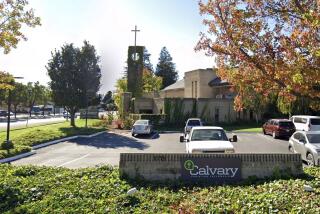Countywide : Court Rules Against Religious Group
- Share via
A Superior Court jury Tuesday ordered the world’s largest Bible-translating organization to pay $186,000 to a Marine sergeant who was evicted from an apartment building it owned because he did not share the group’s religious cause.
Marine Sgt. John Rogers, 37, of Costa Mesa, who waged a four-year fight against Wycliff Bible Translators Inc., said the jury’s message meant more to him than the money.
“They vindicated me,” said Rogers, who works at Tustin Marine Corps Air Station. “The money is not the big thing. What they said is more important, and that is that (Wycliff) has to stop picking on me.”
Stuart M. Parker, Rogers’ lawyer, said that early in the two-week trial, Superior Court Judge Jonathan H. Cannon determined that Wycliff had violated the state Unruh Civil Rights Act, which forbids discrimination by businesses on the basis of sex, race or religion. Jurors were then asked to decide the amount of damages against the Huntington Beach-based nonprofit company.
The violations stemmed from eviction notices served on Rogers and his two sons in December, 1985, and July, 1986, and from an unsuccessful eviction action Wycliff instituted against him in court, Parker said. Cannon also found that a two-tier rent structure, which charged Rogers nearly twice the rent paid by Wycliff’s resident workers, or “members,” violated the Unruh Act, Parker said.
Jurors decided that the eviction put Rogers into such a state of depression that it essentially ended his military career, Parker said. The Marine Corps is discharging Rogers in December after 20 years of service because it considers him “undeployable” due to his depression and the medication he takes for it, Parker said.
Wycliff’s attorney, Sheldon J. Warren of Los Angeles, was unavailable for comment on the verdict.
Rogers and his sons were already living in the 56-unit building on Wilson Street in Costa Mesa when Wycliff acquired it in 1983 as a gift from a donor. Since then, Wycliff has used it to provide low-cost housing to its members. All new tenants since 1983 have been members.
Trying to evict Rogers in Municipal Court, Wycliff’s lawyers argued that the company was exempt from state anti-discrimination laws because it is a religious entity. But in March 1986, a Municipal Court judge disagreed and held that Rogers could not be evicted on religious grounds.
For more than 55 years, Wycliff’s 6,000 members have worked among people in remote areas whose languages are unwritten, cataloguing more than 5,100 languages. Its central principle says, “The Gospel must be given to every man in the language he understands best. No group is too small or too insignificant and no language is too hard.”
More to Read
Sign up for Essential California
The most important California stories and recommendations in your inbox every morning.
You may occasionally receive promotional content from the Los Angeles Times.









